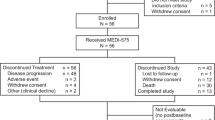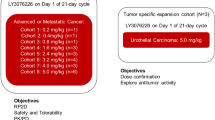Abstract
Purpose
MEDI-575 is a fully human monoclonal antibody that selectively binds to platelet-derived growth factor receptor alpha (PDGFRα). This open-label Phase I study assessed the safety and tolerability of MEDI-575 in Japanese patients with advanced solid tumors.
Methods
The study comprised two parts: Part A, dose escalation; Part B, dose expansion in patients with hepatocellular cancer. In Part A, patients were enrolled into three cohorts: MEDI-575 was administered intravenously over a 21-day treatment cycle at doses of 9 and 15 mg/kg/week (cohorts 1, 2) and 35 mg/kg/3-weekly (cohort 3). In Part B, MEDI-575 25 mg/kg/3-weekly was administered. Secondary measures included assessment of the maximum tolerated dose, pharmacokinetics, immunogenicity and anti-tumor activity.
Results
Ten and 12 patients were treated in Parts A and B, respectively. There were no dose-limiting toxicities; the maximum tolerated dose was not determined. Common treatment-related adverse events were fatigue (30 %) and decreased appetite (20 %) in Part A and decreased appetite (33.3 %) in Part B. All treatment-related adverse events were grade 1 or 2 in severity. No patients discontinued MEDI-575 because of an adverse event and there were no patient deaths due to adverse events. MEDI-575 binding with PDGFRα resulted in a dose-dependent increase in PDGF-AA ligand, with plateau levels observed within 2 days and sustained during the dosing interval. None of the patients in Part A or B experienced complete or partial responses to treatment.
Conclusions
MEDI-575 once weekly and 3-weekly was well tolerated with a favorable pharmacokinetic profile in Japanese patients with advanced solid tumors.
Clinical trial registration
ClinicalTrials.gov, NCT01102400.



Similar content being viewed by others
References
Ostman A (2004) PDGF receptors-mediators of autocrine tumor growth and regulators of tumor vasculature and stroma. Cytokine Growth Factor Rev 15:275–286
Carvalho I, Milanezi F, Martins A, Reis RM, Schmitt F (2005) Overexpression of platelet-derived growth factor receptor alpha in breast cancer is associated with tumour progression. Breast Cancer Res 7:R788–R795
Corless CL, Fletcher JA, Heinrich MC (2004) Biology of gastrointestinal stromal tumors. J Clin Oncol 22:3813–3825
Buitenhuis M, Verhagen LP, Cools J, Coffer PJ (2007) Molecular mechanisms underlying FIP1L1-PDGFRA-mediated myeloproliferation. Cancer Res 67:3759–3766
Stock P, Monga D, Tan X, Micsenyi A, Loizos N, Monga SP (2007) Platelet-derived growth factor receptor-alpha: a novel therapeutic target in human hepatocellular cancer. Mol Cancer Ther 6:1932–1941
Fredriksson L, Li H, Eriksson U (2004) The PDGF family: four gene products form five dimeric isoforms. Cytokine Growth Factor Rev 15:197–204
Bhowmick NA, Neilson EG, Moses HL (2004) Stromal fibroblasts in cancer initiation and progression. Nature 432:332–337
De WO, Demetter P, Mareel M, Bracke M (2008) Stromal myofibroblasts are drivers of invasive cancer growth. Int J Cancer 123:2229–2238
Matei D, Emerson RE, Lai YC, Baldridge LA, Rao J, Yiannoutsos C, Donner DD (2006) Autocrine activation of PDGFRalpha promotes the progression of ovarian cancer. Oncogene 25:2060–2069
Tejada ML, Yu L, Dong J, Jung K, Meng G, Peale FV, Frantz GD, Hall L, Liang X, Gerber HP, Ferrara N (2006) Tumor-driven paracrine platelet-derived growth factor receptor alpha signaling is a key determinant of stromal cell recruitment in a model of human lung carcinoma. Clin Cancer Res 12:2676–2688
Shikada Y, Yonemitsu Y, Koga T, Onimaru M, Nakano T, Okano S, Sata S, Nakagawa K, Yoshino I, Maehara Y, Sueishi K (2005) Platelet-derived growth factor-AA is an essential and autocrine regulator of vascular endothelial growth factor expression in non-small cell lung carcinomas. Cancer Res 65:7241–7248
Capdeville R, Buchdunger E, Zimmermann J, Matter A (2002) Glivec (STI571, imatinib), a rationally developed, targeted anticancer drug. Nat Rev Drug Discov 1:493–502
Jayson GC, Parker GJ, Mullamitha S, Valle JW, Saunders M, Broughton L, Lawrance J, Carrington B, Roberts C, Issa B, Buckley DL, Cheung S, Davies K, Watson Y, Zinkewich-Peotti K, Rolfe L, Jackson A (2005) Blockade of platelet-derived growth factor receptor-beta by CDP860, a humanized, PEGylated di-Fab’, leads to fluid accumulation and is associated with increased tumor vascularized volume. J Clin Oncol 23:973–981
Quintas-Cardama A, Kantarjian H, O’Brien S, Borthakur G, Bruzzi J, Munden R, Cortes J (2007) Pleural effusion in patients with chronic myelogenous leukemia treated with dasatinib after imatinib failure. J Clin Oncol 25:3908–3914
Laing N, McDermott B, Wen S, Yang D, Lawson D, Collins M, Reimer C, Hall PA, Andersen H, Snaith M, Wang X, Bedian V, Cao ZA, Blakey D (2013) Inhibition of platelet-derived growth factor receptor alpha by MEDI-575 reduces tumor growth and stromal fibroblast content in a model of non-small cell lung cancer. Mol Pharmacol 83:1247–1256
Becerra CR, Conkling P, Vogelzang N, Wu H, Hong S, Narwal R, Liang M, Tavakkoli F, Pandya N (2014) A phase I dose-escalation study of MEDI-575, a PDGFRalpha monoclonal antibody, in adults with advanced solid tumors. Cancer Chemother Pharmacol 74:917–925
AstraZeneca (2011) Global policy: bioethics. http://www.astrazeneca.com/Responsibility/Code-policies-standards/Our-global-policies
Acknowledgments
Dr Yuichiro Ohe (National Cancer Center Hospital 5-1-1, Tsukiji, Chuo-ku, Tokyo, Japan) and Dr Junji Furuse (School of Medicine, Kyorin University 6-20-2, Shinkawa, Mitaka-shi, Tokyo, Japan), members of the Data Monitoring Committee/Safety Committee, contributed to the study.
Funding
This study was sponsored by AstraZeneca. Medical writing assistance was provided by Claire Routley PhD from Mudskipper Business Ltd, funded by AstraZeneca.
Author information
Authors and Affiliations
Corresponding author
Ethics declarations
Conflict of interest
HM, TO, YI, and HI have received research funding from AstraZeneca. MI has received honoraria from Bayer Yakuhin, Novartis, Bristol-Myers Squibb, and Abbott Japan and research funding from AstraZeneca. NY has received honoraria and research funding from AstraZeneca. KY is employed by AstraZeneca.
Rights and permissions
About this article
Cite this article
Murakami, H., Ikeda, M., Okusaka, T. et al. A Phase I study of MEDI-575, a PDGFRα monoclonal antibody, in Japanese patients with advanced solid tumors. Cancer Chemother Pharmacol 76, 631–639 (2015). https://doi.org/10.1007/s00280-015-2832-6
Received:
Accepted:
Published:
Issue Date:
DOI: https://doi.org/10.1007/s00280-015-2832-6




